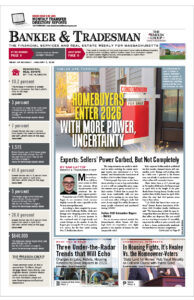Nearly two years since the first case of COVID-19 was officially detected in Massachusetts, the biggest question hanging over the state’s economy remains the continued uncertainty of the global pandemic, an economics and policy researcher said Wednesday.
“As much as I’d like to say the outlook is ‘X,’ and as long as we keep having new variants that are slowing down the economy or reducing confidence every few months, it’s hard to project and say, ‘Well, this is where we’re going to be at the end of the year,'” said Mark Melnik, the UMass Donahue Institute’s director of economic and public policy research.
Melnik offered an economic overview at a virtual event hosted by MassEcon, and listed increasing numbers of people leaving their jobs, higher house prices resulting from lower mortgage rates, rising prices, inflation and supply chain hiccups as among other variables.
The jobs picture in Massachusetts has “improved significantly over the last year and a half to two years,” Melnik said, but has not bounced all the way back to pre-pandemic highs. In April 2020, the jobs deficit compared to the February 2020 peak stood at nearly 692,000, and as of November 2021 it was 172,400, he said.
Massachusetts stands “similar to a lot of states” on jobs recovery at still about 5 percent below peak, Melnik said. He said Massachusetts lands at about 38th in the nation on jobs recovery, but that many states are clustered in the same range, with about 94 percent to 96 percent of jobs recovered. Utah and Idaho are now above their pre-pandemic peaks, while Hawaii is 13 percent below its pre-pandemic level, he said.
“We’re still below peak on our 2020 job numbers, but we’re approaching that and hopefully we would see full recovery at least later this year or early in 2023,” Melnik said.
For employers who are looking to hire, Sue Pardus of KLR Executive Search said offering flexibility, such as by making remote work options available, is key.
“If you’re not offering flexibility, talent can get that,” she said. “Competitors are offering that.”
Pay equity laws can also present a challenge for employers competing for talent, Pardus said.
“You may find that person you want to hire, but they’re demanding or commanding a higher wage or comp package than your existing employees, and here in Massachusetts, and there are other states that have the same law, we have pay equity,” she said. “So you can’t just offer another $25,000 to attract that candidate, that perfect candidate you found, because you need to pay equally for all of your employees doing comparable jobs.”
Offices Should Be ‘Magnet Not Mandate’
Aaron Jodka, research director for U.S. capital markets at Colliers, said businesses should “make your office a magnet, not a mandate” if they are looking to draw workers back on-site after months of remote operations. He said that while some people may find they can be more productive working from home, the mentorship and interaction that can be key for younger and newer workers is missing from that environment.
“And I do wonder if five years down the road, whatever that timeframe is, that some of our younger workers or millennials, and our Gen Z folks will end up having a slower ramp-up in their career development because of this,” he said. “Now, they got to work from home and they could wear sweatpants everyday and that was phenomenal, but you know, when they turn 30, and they go ‘Holy moly, I don’t actually have the skills I thought I had,’ that is something I think we need to need to be aware of.”
Among companies looking for office space in the COVID-19 era, Jodka said parking has become a bigger request than it used to be, as have private, enclosed spaces rather than strictly open layouts.
“We’re seeing people actually care about the filtration system,” he said. “We didn’t get those questions three years ago.”
Confidence among Bay State employers dropped to a 10-month low in December, the Associated Industries of Massachusetts reported Monday. AIM attributed the decline to factors including disruptions from the omicron variant of COVID-19, slower growth in the state’s economy, and persistent supply chain issues.
At 56.7, the index remains in positive territory and is 7.4 points higher than a year ago, but is down 1.2 points from November. AIM President and CEO John Regan said employers remain fundamentally confident and “have created 519,500 jobs since the employment trough in April 2020, boosting the labor-force participation rate from 60.4 percent to 66.3 percent.”
“We face an ever-mutating public health crisis, a generational shortage of qualified workers, supply chain disruptions, the highest inflation since the early 1990s and shifting expectations about the nature of work itself,” Regan said. “Despite these challenges, however, many Massachusetts companies and their employees are finding ways to thrive.”








